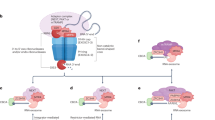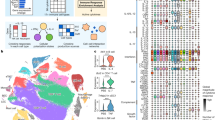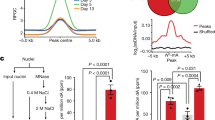Abstract
The bHLHZip protein Max interacts with both the Myc and Mad family proteins forming heterodimers which specifically bind certain E-box DNA recognition sequences, thereby regulating transcription. Whereas Myc proteins actively promote cell proliferation, Mad complexes have the opposite function. Although the main regulation of this network seems to be the control of myc- and mad family gene expression, regulation at the level of DNA-binding and transactivation may also be in operation. Few studies on the DNA-binding activity of native Myc : Max or Max : Mad complexes have been reported mainly due to technical difficulties. To overcome these problems we have developed a specific and sensitive solid phase DNA-binding assay based on partial purification of native Myc, Max and Mad1 complexes by immunological methods. Using this technique we report that the DNA-binding activity of c-Myc-containing complexes is reduced during induced differentiation of U-937 monoblasts and F9 embryonic teratocarcinoma cells. In contrast, the DNA-binding of Mad1-containing complexes increases during monocytic differentiation. In general, the DNA-binding activity of c-Myc and Mad1 correlate with their expression. However, our studies of early kinetics of TPA-induced differentiation of U-937 cells as well as of late events during F9 differentiation suggest that post-translational regulation of Myc and Max DNA-binding may also occur. The solid phase DNA-binding assay may thus provide a tool to study the regulation of DNA-binding in more detail.
This is a preview of subscription content, access via your institution
Access options
Subscribe to this journal
Receive 50 print issues and online access
$259.00 per year
only $5.18 per issue
Buy this article
- Purchase on Springer Link
- Instant access to full article PDF
Prices may be subject to local taxes which are calculated during checkout
Similar content being viewed by others
Author information
Authors and Affiliations
Rights and permissions
About this article
Cite this article
Larsson, LG., Bahram, F., Burkhardt, H. et al. Analysis of the DNA-binding activities of Myc/Max/Mad network complexes during induced differentiation of U-937 monoblasts and F9 teratocarcinoma cells. Oncogene 15, 737–748 (1997). https://doi.org/10.1038/sj.onc.1201390
Received:
Revised:
Accepted:
Issue Date:
DOI: https://doi.org/10.1038/sj.onc.1201390
Keywords
This article is cited by
-
Cytokine-induced restoration of differentiation and cell cycle arrest in v-Myc transformed U-937 monoblasts correlates with reduced Myc activity
Leukemia (2001)
-
The Mad1 transcription factor is a novel target of activin and TGF-β action in keratinocytes: possible role of Mad1 in wound repair and psoriasis
Oncogene (2001)
-
New Myc-interacting proteins: a second Myc network emerges
Oncogene (1999)
-
The basic region/helix – loop – helix/leucine zipper domain of Myc proto-oncoproteins: Function and regulation
Oncogene (1999)



